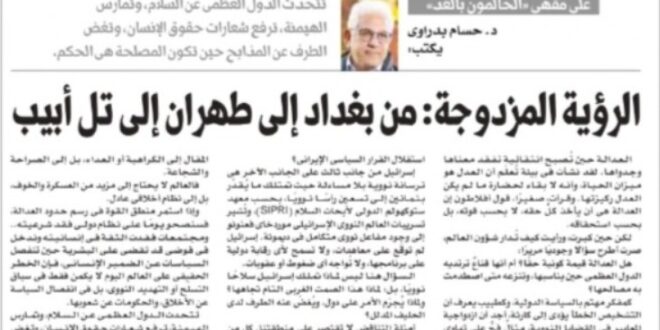Double Standards: From Baghdad to Tehran to Tel Aviv
Justice, when it becomes selective, loses both its meaning and its worth.
I was raised in an environment that taught justice as the foundation of life—without it, no civilization can endure.
As a child, I read Plato’s words:
“Justice is giving everyone their due—not based on power, but on merit.”
But as I grew older and witnessed how global affairs are conducted, I began to ask a bitter existential question:
Is justice truly a universal value? Or is it a mask worn by great powers when convenient—and cast aside when it clashes with their interests?
As a thinker interested in international politics—and as a doctor who knows that a wrong diagnosis leads to disaster—I see the nuclear issue as a glaring example of how values collapse in the face of raw power.
From Baghdad to Tehran to Tel Aviv, standards shift, laws are molded by interest, the weak are punished, and the favored are rewarded.
Take Iraq, for example. It was a grand lie paid for in blood.
In 2003, the United States invaded under the pretext of weapons of mass destruction, chiefly nuclear arms.
Despite the lack of any credible evidence, a war was launched that resulted in the death of nearly 1.2 million Iraqis, according to a 2008 study, along with the destruction of state infrastructure and the onset of chaos that continues to this day.
Later, American officials—including Colin Powell—admitted that the intelligence was flawed.
Yet no one was held accountable, neither locally nor internationally.
Iran, in contrast, signed the Nuclear Non-Proliferation Treaty (NPT) and allowed regular inspections by the International Atomic Energy Agency (IAEA).
In fact, the IAEA’s 2020 report noted “no evidence of deviation from peaceful nuclear activities.”
Still, Iran continues to face sanctions and pressure.
The 2015 JCPOA nuclear deal was unilaterally torn apart by the Trump administration in 2018, even though Iran had not violated its terms.
So the question becomes: Is the issue truly about nuclear weapons—or about Iran’s political independence?
Israel, on the other hand, possesses a nuclear arsenal without any accountability.
It is believed to hold between 80 to 90 nuclear warheads, according to the Stockholm International Peace Research Institute (SIPRI), and whistleblower Mordechai Vanunu revealed the existence of a full-scale nuclear reactor in Dimona.
Israel has not signed the NPT, does not allow international inspections, and faces no sanctions or pressure.
The question is not why Israel has nuclear weapons, but rather:
Why is the West completely silent about it?
Why is nuclear capability criminalized for some, while ignored for a favored ally?
The contradictions are not limited to our region.
India and Pakistan both possess nuclear weapons, conducted tests in 1998, and have refused to join the NPT.
Yet, India received a nuclear cooperation agreement with the U.S. in 2008, despite not abiding by international norms—another stark double standard.
Nuclear weapons are tolerated if you’re an ally; forbidden if you’re not.
This political hypocrisy undermines the credibility of the Western narrative.
The same double standards appear in human rights: invoked against specific rivals, but ignored when allies commit abuses.
Democracy is imposed in some nations by force, while dictatorships are supported elsewhere.
Such hypocrisy weakens the global credibility of the Western voice—and feeds skepticism, not just about intentions, but about the very values it claims to uphold.
We must strive for a universal, not selective, justice.
This is not a call to justify nuclear proliferation, but rather a demand for the application of uniform rules for all.
If Israel possesses a nuclear arsenal, it must be subject to oversight—or at the very least, held accountable like others.
There is no justice with exceptions, and no real international order if it’s built on selective enforcement, not on equal standards.
Let us face the contradiction with courage.
This is not a call for hatred or hostility—but for honesty and bravery.
What the world needs now is not more militarization and fear, but a just moral order.
If the logic of power continues to define justice, we may one day wake to a global system that has lost its legitimacy, and to societies that have lost faith in humanity.
When politics disconnects from conscience,
The real threat to the world lies not only in the arms race or nuclear danger,
But in the divorce of politics from ethics, and governments from their people.
Major powers speak of peace while practicing dominance;
They wave the flag of human rights while turning a blind eye to massacres—if it serves their interests.
Shouldn’t international relations be based on shared values like dignity, equality, and the right to life?
Isn’t it ironic that the West speaks of a “values-based global order”, while overlooking injustice when committed by an ally—and protesting only when it’s a foe?
Public opinion polls in many Western countries reveal a growing gap of trust between citizens and their governments.
The widespread protests across Western societies in solidarity with the Palestinian people have shown that the public sympathizes with the oppressed, while their governments take purely self-serving stances, disconnected from the values they preach.
Here lies a fundamental flaw:
The people are better than their politicians.
The collective conscience of societies is not in harmony with the decisions of their political systems.
The world desperately needs to remind itself that justice is not a political tool—but an existential value.
And those who exploit values as a means to impose dominance lose themselves first—and then lose the trust of the world.
Without aligning politics with conscience, power with wisdom, and legitimacy with ethics,
We will continue to spiral in a cycle of contradiction, bloodshed, and betrayal.
 Dr. Hossam Badrawi Official Website
Dr. Hossam Badrawi Official Website


